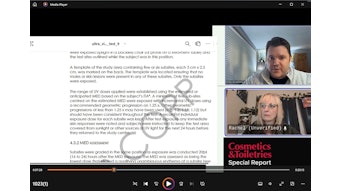During the June 30, 2006, Cosmetics Business Summit held in Brussels, Günter Verheugen, vice president of the European Commission responsible for enterprise and industry, addressed three key topics concerning the personal care industry in Europe: the Registration, Evaluation and Authorization of Chemicals program (REACH); animal testing; and improving regulations. In his address, Verheugen stated: “The European personal care industry makes an important contribution to innovation, growth and jobs in Europe. It is providing more than 400,000 jobs and it is a world leader in innovation and the biggest exporter worldwide.”
Furthermore, he added that personal care products are used by almost everyone every day and that it is a common misconception that “cosmetics” are luxury items--they include products such as sunscreens that are important to the well-being and protection of consumers.
He first discussed the REACH program. According to Verheugen, the next stage of negotiations will occur this fall and if they go smoothly, the new law will enter into force in the first half of 2007. He commented: “The cosmetics industry is mainly a downstream user of chemicals. As such [the industry] will greatly benefit from the new law. It will improve the information flow of safety data for ingredients, helping [manufacturers] to assess the safety of products. It is therefore no surprise that the cosmetics industry has always supported the objectives of REACH.” The European Commission reportedly is working on the next challenge: Implementation, which Verheugen sais poses significant challenges.
One issue is the increased cooperation of chemicals suppliers in the registration process. It is said to render registration cheaper, improve the quality of data and reduce the number of animal tests. However, legislators have to be careful that this cooperation does not lead to illegal market behavior.
Another example is the importation of substances. According to Verheugen, “We are not setting up a ‘fortress Europe.’ The importer of a chemical has the same obligations as the manufacturer in Europe. Not more and not less. And I ask those who import cosmetics to please consider REACH as an opportunity--an opportunity to improve knowledge about the substances used and to enhance the safety of products. We are aware of the challenges of implementation and are working on them already.”
He then turned to the topic of animal testing: “I am aware that the animal testing regime, as introduced for cosmetics in 2003, poses a significant burden on industry. But I am convinced that it is justified, because it reflects our political and ethical obligations. However, the European Commission does not leave industry to take this on alone.” Between 2001 and 2006, the commission reportedly spent €65 million on funding the research and validation of alternative methods. From 2007 to 2013, Verheugen said he has intervened personally to ensure that this financial support continues and even increases. However, alternative testing is not just a matter of money, it is a matter of ideas.
”The European partnership to promote alternative approaches to animal testing is an important step forward. It brings together the different industries concerned: chemicals, pharmaceuticals, crop protection, biotechnology and cosmetics. And I am very happy about the strong commitment of the industry to the partnership,” said Verheugen. He added that the personal care industry is not only selling a product, it is selling a concept that is not limited to safety; it extends to other aspects. And one of these other aspects is animal testing. “Today, you may perceive the rules for animal tests in Europe as a burden. But in the future, the awareness that European cosmetics are not tested on animals will be an important asset when competing on the global marketplace.”
Finally, Verheugen addressed better regulation. Last year, the commission revisited and reconfirmed the Lisbon agenda in a more focused way. He said that growth and jobs are created by business and industry, not by the commission, but one thing that can be done in Brussels is improve the legal framework so that manufacturers can play out their strengths. “For example, we can render legislation simpler. And we can render compliance cheaper. This is the core of the better regulation initiative,” said Verheugen.
”Unfortunately, it is true what is written so often: EU laws tend to be too complicated, too fragmented and even contradictory. But we are committed to change this: our simplification program, adopted last year, lists 220 community laws to be reviewed before 2009. The Cosmetics Directive is included in this list because it is a good example of unnecessary complexity: it is a patchwork of 44 amendments without a clear set of definitions and without coherent terminology.”










